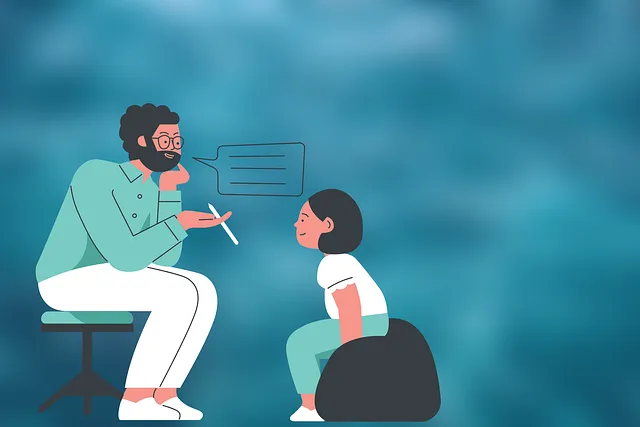Kaiser Permanente Mental Health Aurora offers holistic mental healthcare that goes beyond medical intervention, focusing on self-care routines and empowering individuals to navigate daily life with confidence. Their Social Skills Training incorporates emotional intelligence development, comprehensive risk assessment, adaptive coping strategies, effective communication techniques, and integrated self-care practices. These structured sessions improve well-being, enhance social interactions, and facilitate meaningful connections, particularly beneficial for managing anxiety or depression.
Social skills training is a powerful tool for individuals navigating mental health conditions. This article explores the intricate link between social skills and mental wellness, highlighting how programs like those offered by Kaiser Permanente Mental Health Aurora can significantly improve lives. We delve into key components of effective training, uncovering benefits ranging from enhanced self-esteem to improved relationships. By examining real-world applications, we demonstrate the transformative potential of social skills development for individuals supported by organizations like Kaiser Permanente Mental Health Aurora.
- Understanding the Link Between Social Skills and Mental Health
- The Role of Kaiser Permanente Mental Health Aurora in Training Programs
- Key Components of Effective Social Skills Training
- Benefits and Real-World Applications for Individuals with Mental Health Conditions
Understanding the Link Between Social Skills and Mental Health

In today’s world, social skills play a pivotal role in our mental well-being, especially for individuals managing mental health conditions. Kaiser Permanente mental health Aurora experts emphasize that strong social connections and effective communication are essential components of recovery and overall health. Mental health challenges can often isolate people, making it difficult to initiate or maintain meaningful interactions with others. However, by focusing on improving social skills, individuals can foster better relationships, enhance their support systems, and ultimately boost their confidence.
The link between social skills and mental health is complex. Emotional intelligence, a key aspect of social skills training, helps individuals recognize and manage their emotions as well as understand and empathize with others. This ability to connect emotionally can significantly reduce feelings of loneliness and depression. Moreover, participating in Social Skills Training programs designed by Kaiser Permanente mental health Aurora professionals enables clients to build self-esteem, practice assertiveness, and learn coping strategies that facilitate more positive social exchanges. Ultimately, these skills contribute to a more fulfilling life, serving as a powerful tool in managing and improving mental health conditions.
The Role of Kaiser Permanente Mental Health Aurora in Training Programs

Kaiser Permanente Mental Health Aurora plays a pivotal role in shaping holistic mental health care through comprehensive training programs. They recognize that effective treatment involves more than just medical intervention; it’s about empowering individuals with essential social skills to navigate their daily lives confidently. Their programs focus on fostering self-care routine development, encouraging clients to prioritize their well-being as a fundamental aspect of managing their mental health conditions.
The team at Kaiser Permanente Aurora also emphasizes risk management planning for mental health professionals, ensuring that practitioners are equipped to handle challenging situations safely and ethically. They integrate self-awareness exercises into their curriculum, promoting an understanding of one’s emotions, triggers, and coping mechanisms. These strategies collectively contribute to a more effective and compassionate approach to mental health care.
Key Components of Effective Social Skills Training

Social Skills Training plays a pivotal role in managing mental health conditions, especially when tailored to individuals’ unique needs, as offered by Kaiser Permanente mental health Aurora. Effective programs typically incorporate several key components. One of the foundational aspects is emotional intelligence (EI) development. This involves enhancing self-awareness and understanding others’ emotions, which can lead to improved communication and empathetic interactions.
Additionally, a comprehensive risk assessment for mental health professionals is crucial to identify areas needing improvement. Training should focus on building adaptive coping strategies, promoting effective communication techniques, and fostering healthy relationships. Incorporating self-care practices into the curriculum empowers individuals to manage their conditions proactively while navigating social environments.
Benefits and Real-World Applications for Individuals with Mental Health Conditions

Social skills training offers numerous benefits for individuals navigating mental health conditions, providing them with essential tools to enhance their overall well-being. Through structured programs like those offered by Kaiser Permanente mental health Aurora, participants gain confidence in interacting with others, improving their ability to form meaningful connections and navigate social environments. This support is crucial for managing conditions such as anxiety or depression, where social isolation can exacerbate symptoms.
Real-world applications of these training sessions are vast. They encourage the development of effective communication strategies, active listening skills, and empathy, fostering better relationships with family, friends, and colleagues. Moreover, mindfulness meditation techniques taught in these programs help individuals regulate emotions, reducing impulsive behaviors and promoting mental wellness coaching. The integration of cultural sensitivity in mental healthcare practice ensures that training is inclusive and respectful, catering to diverse backgrounds, which is vital for building a supportive network tailored to each individual’s unique needs.
Social skills training, as recognized and facilitated by institutions like Kaiser Permanente Mental Health Aurora, plays a pivotal role in improving outcomes for individuals managing mental health conditions. By focusing on key components such as communication, empathy, and group interaction, these programs empower participants to navigate social environments with greater confidence. The benefits extend far beyond the training hall, enabling individuals to form stronger connections, enhance their support networks, and lead more fulfilling lives in the community.






